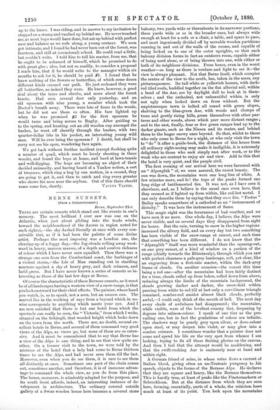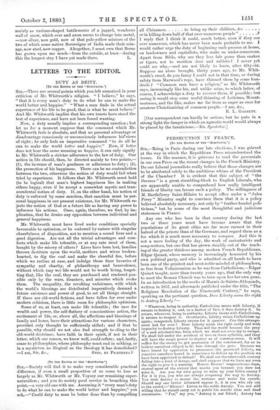BERNE SUNSETS.
(FROM A CORRESPONDENT.] Berne, September 21st. THERE are certain sunsets which stand out like events in one's memory. The most brilliant I ever saw was one on the Atlantic, when just about gliding into the trade winds, toward the neighbourhood of the Azores (a region noted for such sights),—the sky dashed literally at once with every con- ceivable tint, as if it had been the palette of some divine artist. Perhaps the most imposing was a London one, the clearing-up of a foggy day,—the fog-clouds rolling away west- ward in heavy, maroon masses, of a depth and sombre richness of colour which I have never seen equalled. Then there was a strange one seen from the Cumberland coast, the harbinger of a violent storm,—the Isle of Man standing out in startling nearness against a sky of heavy grey, and dark crimson, and lurid green. But I have never known a series of sunsets so in- teresting as those of the last few days at Berne.
Of course the characteristic of these Bernese sunsets, as it must be of all landscapes having a western view of a snow-range, is that you look eastward for their chief effects. The painter, whose hand you watch, is, so to speak, not a seen, but an unseen sun. The marvel lies in the working of rays from a beyond which in no- wise corresponds to anything which meets your eye. And I am now satisfied that there is but one hotel from which the spectacle can really be seen, the "Victoria," from which I write, situated on the Schiingli, that wooded height which looks down on the town from the north. There are, no doubt, several ex- cellent hotels in Berne, and several of them command very good views of the Alps, as views go, but none of them are so exten- sive. And it must be remembered that to say that Berne has a view of the Alps is one thing, and to see that view quite an- other. On a former visit to the town, we were told by the mistress of the hotel that a lady had come to Berne thirteen times to see the Alps, and had never seen them till the last. Moreover, even when you do see them, it is rare to see them all distinctly at once. Sometimes one part of the chain comes out, sometimes another, and therefore, it is of immense advan- tage to command the whole view, as you do from this place. The house, moreover, is admirably adapted for the purpose, and its south front affords, indeed, an interesting instance of de- velopment in architecture. The ordinary covered outside gallery of a Swiss wooden house here becomes a covered stone
balcony, two yards wide or thereabouts in its narrower portions, three yards wide or so in the broader ones, but always wide enough at least for a sofa or a chair, a table, and space to pass, and most ingeniously divided off by movable wooden partitions running in and out of the walls of the rooms, and capable of being locked on to one of the outer uprights, so that each balcony division forms in fact an outdoors room, capable either of being used alone, or of being thrown into one, with either or both of its neighbour divisions. From hence, even in the worst weather—so long as there is verdure and light to see it—the view is always pleasant. Not that Berne itself, which occupies the centre of the view to the south, has, taken in the mass, any picturesqueness. Its tall white or yellowish houses, with dark'. red tiled roofs, huddled together on the flat alluvial soil, within a bend of the Aar, are by daylight dull to look at in them- selves ; and the cathedral, not nnbeautiful within, is only not ugly when looked down on from without. But the unpicturesque town is belted all round with green slopes, shelving to the blue-green Aar, with woods and clumps of trees and gently rising hills, green themselves with other pas- tures and other woods, above which peer more distant ranges and to the east, finally, four or five green ranges lead up to the darker giants, such as the Niesen and its mates, and behind these to the huger snowy ones beyond. So that, whilst to those who only come to Berne for a night, or who only visit the town to "do" it after a guide-book, the distance of this house from all ordinary sight-seeing may make it ineligible, it is extremely delightful to those who seek simply rest after work, or to the weak who are content to enjoy air and view. Add to this that the hotel is very quiet, and the people civil.
The first evening of our arrival here we were favoured with an " Alpengliih " of, we were assured, the rarest beauty. The- sun was down, the mountains were one long line of white. A few minutes more, and lo the tops of the peaks formed one- long ridge of battlemented fire. It was not, as I have seen it elsewhere, and, as I believe is the usual case even here, that they seemed as if lighted up from within, like red-hot metal. I can only describe them by saying that they were fire. " Festns Bailey speaks somewhere of a cathedral as an " instonement of divinity." It was here the instonement of flame.
This magic sight was the forerunner of bad weather, and we- have seen it no more. One whole day, I believe, the Alps were never visible, and on several days they disappeared from sight for hours. But the rain, turning to snow in the higher regions increased the silvery field, and on every day but two something has been visible of the snow-range at sunset, and each time that something has been different. I do not know that the " Alpengliih " itself was more wonderful than the opening-out, on one grey sunset, of a kind of window on a portion of the range (chiefly towards the Bliimtesalp), through which you saw with perfect clearness a pale-grey landscape, soft, yet clear, like an engraving from a first-rate master, within the dark-grey frame of clouds. On another occasion—the sunset this time being a red one—after the mountains had been fairly distinct for a time, clouds rolled up from below, rolled down from above, reducing always the limits of the mountain background, the clouds growing darker and darker, the snow-field within passing from white to red till at last only a curvilinear triangle remained, sombre-red amidst almost black clouds, perfectly awful,—I could only think of the mouth of hell. The next day every shade of awfulness had disappeared; the mountains, while visible, were of the loveliest creamy tint, deepening by degrees into salmon-colour. I speak of one tint as the pre- vailing one, but in fact the gradations of colour are infinite.. The shadows may be pearly grey upon silver, or dove-colour upon steel, or may deepen into violet, or may glow into a sombre crimson. I sometimes wonder that a painter does not come and spend his life on the very spot from whence I am looking, trying to fix all these fleeting glories on the canvas.. And then I feel that the attempt would be maddening, and that the swift-rushing Aar is ominously near at hand and within sight.
A German friend of mine, in whose veins flows a current of Italian blood, giving often an un-Teutonic pungency to ..his speech, objects to the forms of the Bernese Alps. He declares that they are square .and heavy, like the Bernese themselves. This is hardly true, at least of peaks like the Fineteraarhorn or Schreckhorn. But at the distance from which they are seen here, forming, essentially, parts of a whole, the criticism loses much at least of its point. You look upon the mountains mainly as various-shaped battlements of a jagged, wondrous wall of snow, which ever and anon seems to change into metal, —now silver, now gold, now of that pale-yellow mixture of the two of which some native Sovereigns of India made their coin- age, now steel, now copper. Altogether, I must own that Berne has grown upon me much—from the outside, at least—during this the longest stay I have yet made there. L.



































 Previous page
Previous page